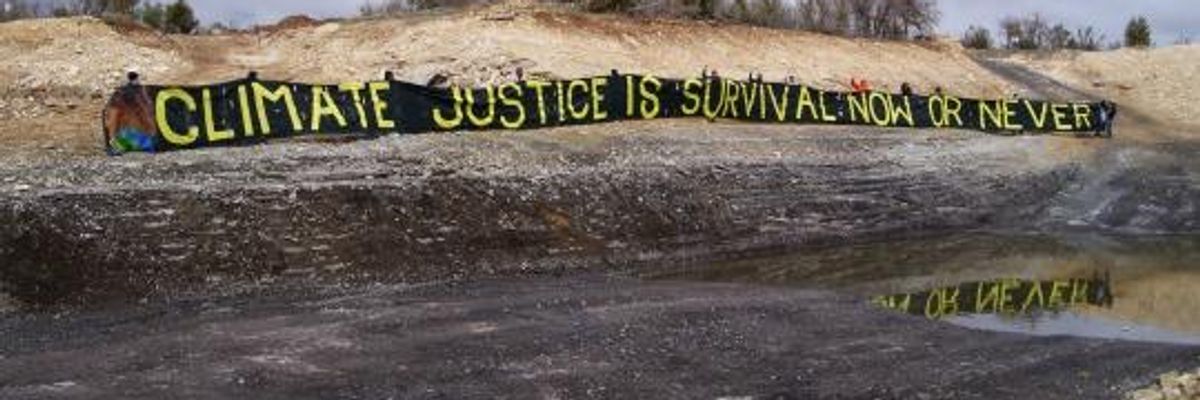As a Canadian company readies its plans for extraction at the first proposed tar sands mine in the United States, a group of climate justice activists is readying its own mobilization: a permanent protest vigil at the site to protest what they see as the project's "swift obliteration" of ecosystems, danger to waterways and contribution to the fossil fuel-driven climate emergency.
The company, Calgary, Alberta-based US Oil Sands, has leased over 32,000 acres of public land in the Book Cliffs area of Utah, and foresees its $60 million PR Springs project producing tar sands in 2015. The site of the mine also sits just outside the Northern Ute Ouray Reservation.
The project has faced ongoing resistance from environmental groups who have seen the devastating impacts the Alberta tar sands have brought to land, water and indigenous communities.
"These beautiful lands that US Oil Sands plans to destroy have been enjoyed by Utahns for decades and were the home for Ute people for hundreds of generations," Jessica Lee, a spokesperson for Utah Tar Sands Resistance and Peaceful Uprising, said in a statement. "This tar sands strip mine would cause swift obliteration of multiple ecosystems and severe contributions to climate-change related disasters."
Those two climate justice groups, as well as Canyon Country Rising Tide, aim to to put a spotlight on what US Oil Sands is doing to the biodiverse area with the permanent vigil, which was launched over the weekend.
They've held periodic camp-outs over the years, Lee told Common Dreams, and the groups are hoping the permanent vigil, located within the 32,000-acre leasehold, will offer a place where journalists and others who are concerned can come and see what's at risk.
"We're going to be able to observe what they're doing to the area," she said. The company gives out the impression that everything's going well, because that's what it wants its investors to hear, she said.
About a two-hour walk from the US Oil Sands mine is a 30-year-old tar sands mine that was abandoned because it was unable to make a profit, Lee said. "That land has never been recovered. It's had 30 years to recover itself. Nothing grows there. It's a dead zone," she said, and referenced its degradation as sign of how unlikely US Oil Sands' claims of land recovery are.
The company is also set to be the first to use a citrus-based chemical solvent in its processing of tar sands. The company claims it is environmentally-friendly, and chief executive Cameron Todd has said, "This stuff will smell lemony fresh."
Hogwash, said Lee.
The claim that this chemical--limonene--is somehow going to make their project environmentally-safe is "a blatant lie," Lee said. Further, it's expensive, and the price goes up and down tremendously, up to as much as $36 dollar a gallon, and the project is going to "require an insane amount" of it, she added.
On top of that, "the chemical will release carcinogens that exist in tar sands." She explained that the tar sands act as a filter through which all water passes, so that when they are released, they are going to release things like mercury, arsenic and traces of uranium into the ground system and air. "The idea that this is going to be environmentally-friendly is insane," she said.
The question of water impacts is key is this desert region, the groups stress, and those impacts cross state lines.
The potential water contamination from the tar sands mining could affect the Green River and White River, which both feed into the Colorado, one of the nation's most endangered, Lee added.
"Twenty million people depend on that water for drinking, for food," she said. "The idea that we would risk it. . . [would allow it] to become toxic," is "insanity." "Every year water becomes more of an issue," she noted, yet the state seems to have "no consideration for water." It's an entire region at risk of losing this precious resource, and the impacts will be long-lasting, Lee said.
At a civil disobedience action at the site of the mine last weekend, the groups unfurled a banner reading: Climate Justice Is Survival: Now or Never.
And survival means stopping the US Oil Sands project, they write. "The Utah tar sands must remain in the ground if we have any hope of a livable future, and a coalition of passionate and dedicated people have taken a stand, saying, 'no tar sands!'"
_______________________

